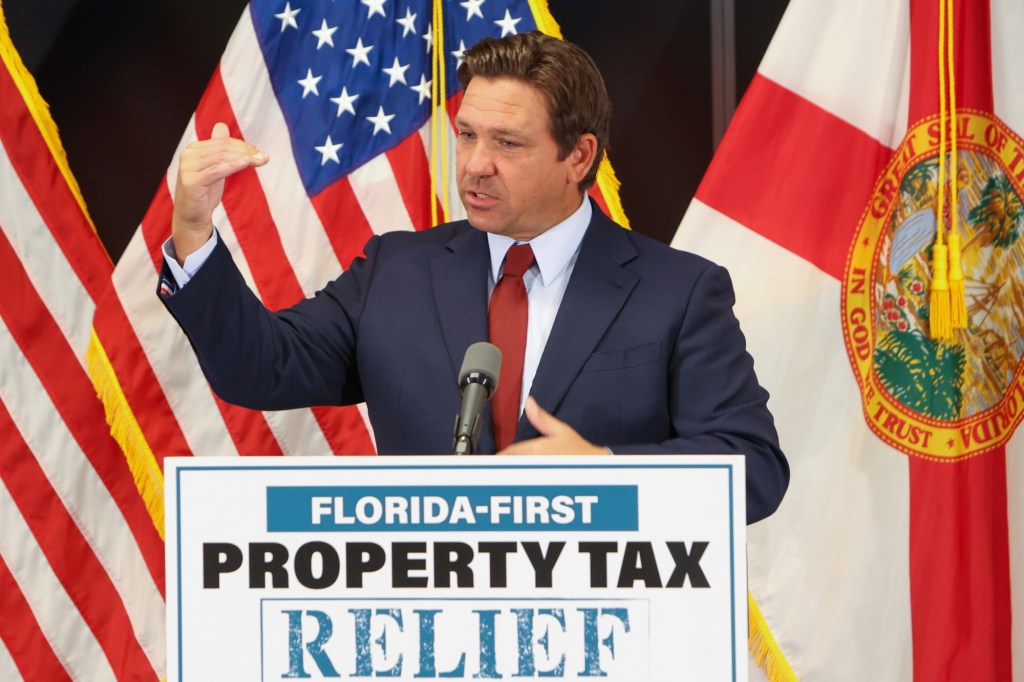Gov. Ron DeSantis unveiled a proposal Monday to provide $1,000 tax rebates to homeowners, an “opening salvo” toward his goal of eliminating property taxes entirely in 2026.
The rebate, which must be approved by the Legislature, is the governor’s first substantial tax recommendation this year in his clash with Florida House Speaker Daniel Perez. But with both men pushing their plans, it seems increasingly possible that one way or another, many Floridians will see a tax break this year.
Perez wants to reduce the sales tax rate from 6% to 5.25%, while DeSantis said the state needs to prioritize property tax relief for Floridians with homestead exemptions. Both proposals would provide $5 billion in tax relief.
“Tax relief needs to be Florida first,” DeSantis said at an event at the Florida Realtors’ headquarters in Orlando. “We need to focus on our Florida residents.”
The tax rebates would be issued in December if the Legislature approves, according to the governor’s office.
DeSantis has been critical of Perez’s tax package, noting that a sales tax break would also benefit tourists. The governor estimated his proposal would reduce tax bills by about $1,000 for the state’s 5.1 million homesteaded properties.
He did not say if the rebate would be recurring. But he reiterated his ultimate objective is to abolish property taxes, a move that would require legislative and voter approval.
“I want Canadian tourists and Brazilian tourists subsidizing the state and making it so Florida residents pay less taxes,” DeSantis said.
Abolish the property tax? Momentum builds for Florida overhaul
Perez, though, is touting the proposed sales tax break he announced last week as a way to “make Florida more affordable.” In a statement, he said he welcomes DeSantis’ proposal and looks forward to continued conversations.
“I am pleased that the governor has embraced the House’s record-breaking spending reductions,” said Perez, R-Miami. “There is much work to be done in this area, and we are just getting started. I look forward to a willing partner in the governor to meet these challenges head-on.”
In a memo, Senate President Ben Albritton said he thinks both proposals are worthy of “thought and consideration,” although he prefers one-time, nonrecurring relief in the final tax package while exploring permanent tax reductions for the future.
“I look forward to working with the House and Gov. DeSantis on a compromise that ensures historic relief for Florida taxpayers, while maintaining sound financial planning for the future,” said Albritton, R-Wauchula.
DeSantis did not rule out supporting a sales tax break, but he said property tax relief should be the priority.
“Are you going to focus on what gets you the most bang for the buck to help Florida residents? That is where I think the focus needs to be,” he said. “So you’ve got to do property relief. If you want to do sales on top of that, I’m all for that, for sure. But this property stuff needs to be addressed.”
DeSantis did not offer a detailed plan on how the rebates would work. Though most property tax revenue supports local government, DeSantis said the state could cut funds that go to support schools. The state budget has sufficient reserves to cover the loss, he added.
For an Orlando taxpayer whose home has a $300,000 tax valuation, that would mean a savings of 19% of their property tax bill, or about $900.
Florida House Speaker proposes historic, permanent state sales tax cut
The tax fight comes amid DeSantis’ ongoing campaign to allow voters to decide whether property taxes should be eliminated entirely. If placed on the ballot in 2026, that proposal would need the support of at least 60% of voters to pass.
Lawmakers are considering a bill that would study the impact of ending property taxes, which would cost Florida’s cities, counties, schools and special districts more than $50 billion in revenue. Such a revenue blow would affect police, fire and other critical government services, according to an analysis by the Florida Policy Institute, a left-leaning think tank.
Orange County Tax Collector Scott Randolph, a Democrat, said he thinks the rising cost of property insurance is a bigger factor hurting homeowners than taxes.
Florida’s “Save Our Homes” rule means a homesteaded property’s value cannot grow more than 3% year over year, while the value of other properties cannot grow more than 10% with an exception for school taxes.
“This is just a cover up of their failure to stop property insurers from ripping off homeowners for the last decade,” Randolph said. “Period.”
Originally Published:







